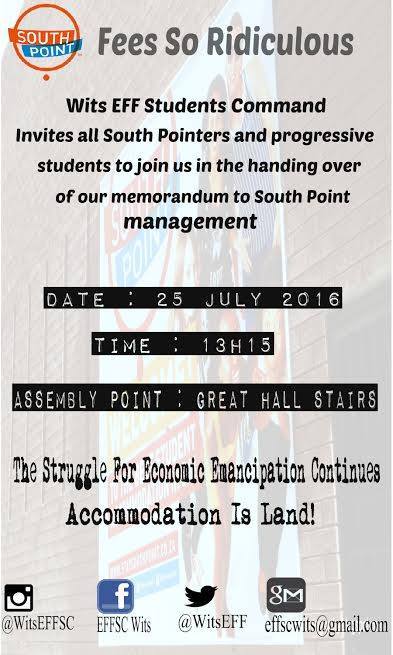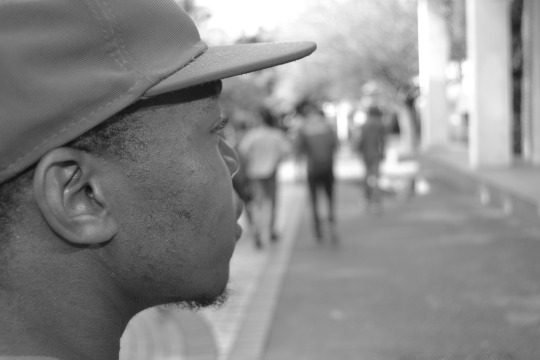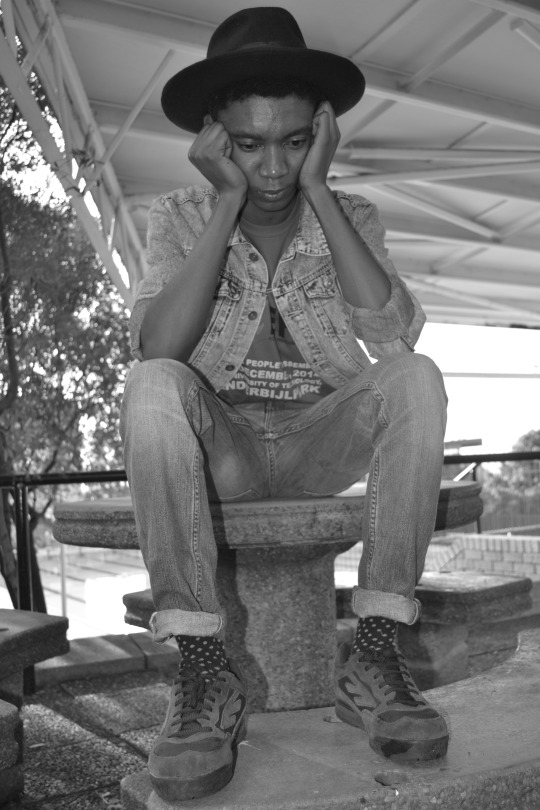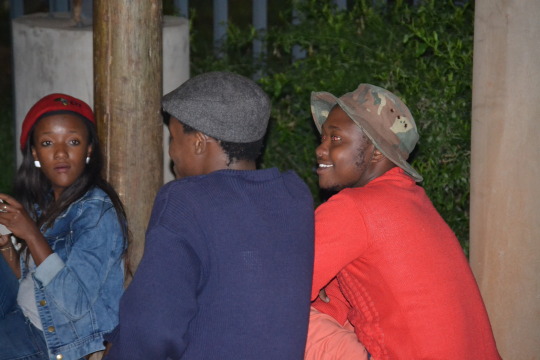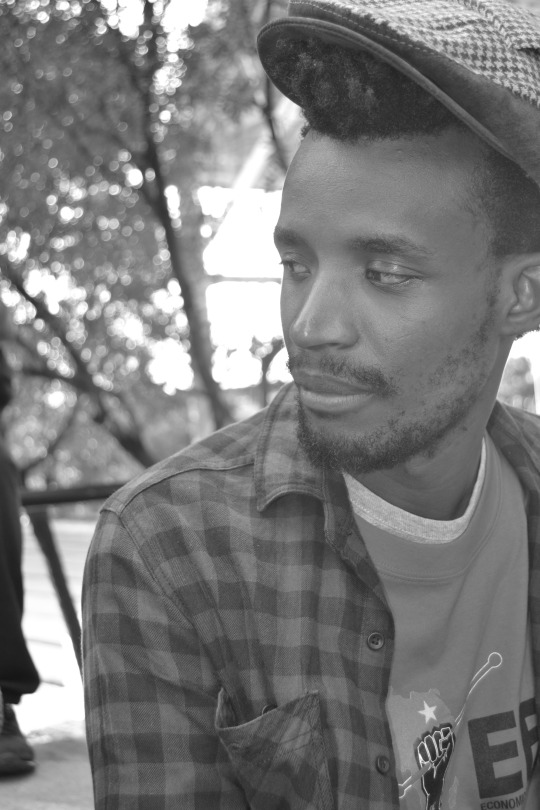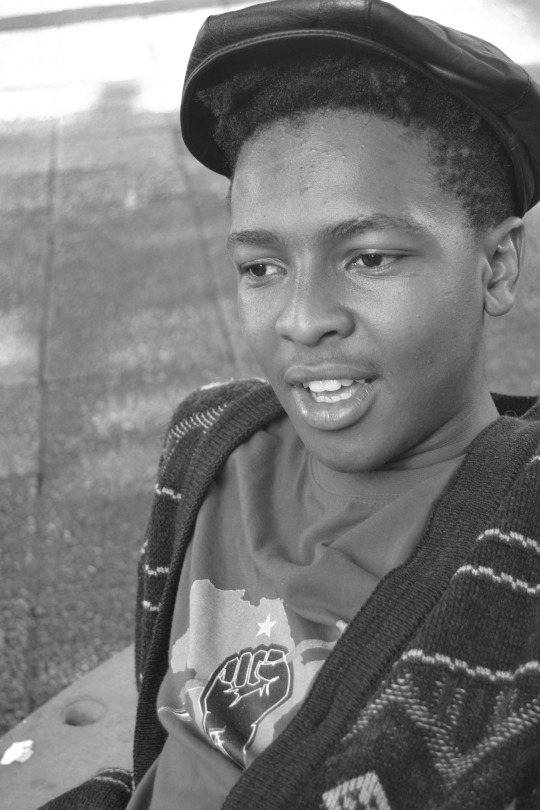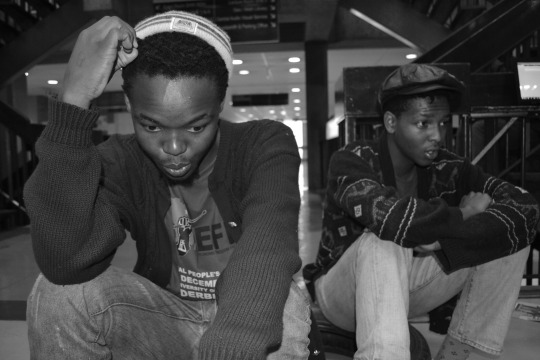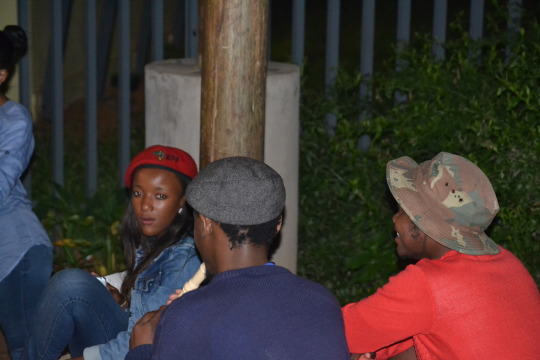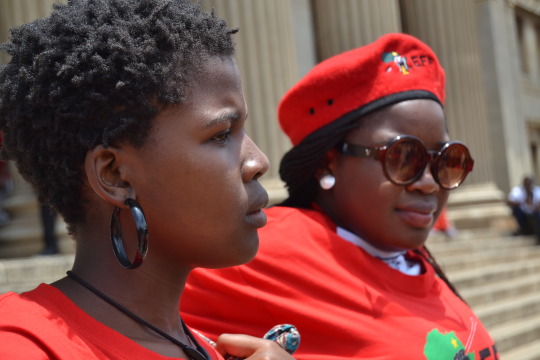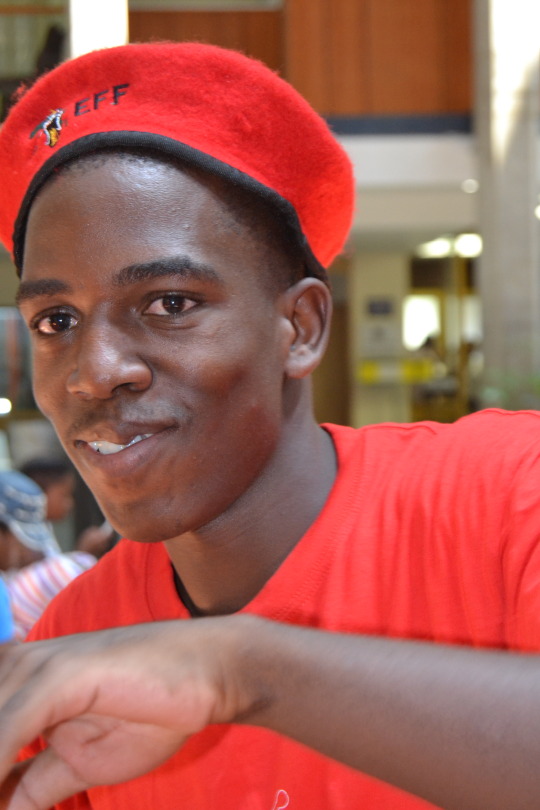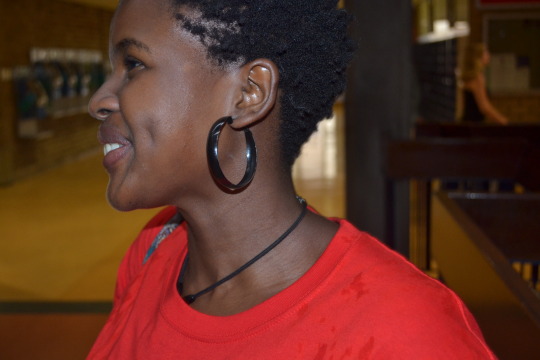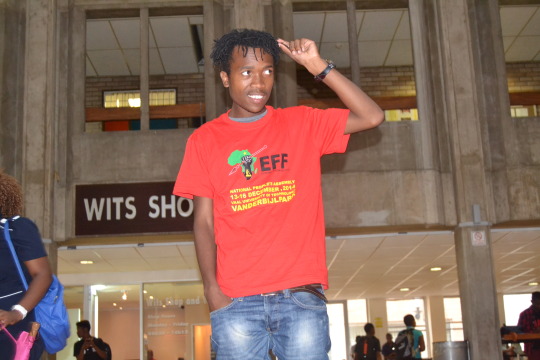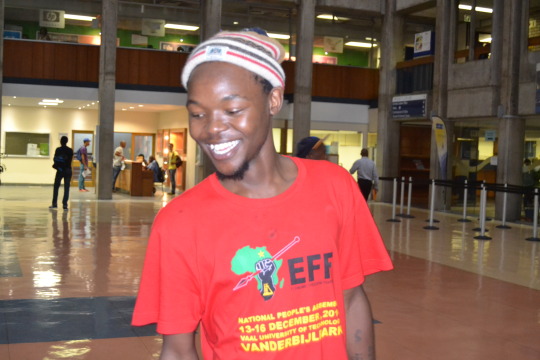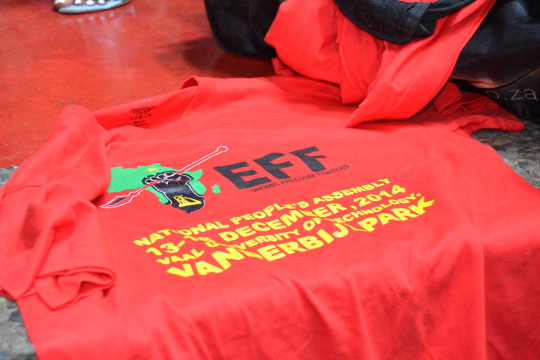Don't wanna be here? Send us removal request.
Text
STATEMENT OF THE WITS EFFSC ON THE PREMATURE ANNOUNCEMENT OF SRC ELECTION RESULTS.
The Economic Freedom Fighters Students Command Wits Branch notes with concern the imminent announcement of SRC Election results without the completion of manual counting. We believe that the primary logic of the bilateral vote counting system was to verify that the two results complement one another. We requested that manual counting happen even before the elections because we felt that the electronic results can be tampered with.
We are taken aback by this imminent announcement as it was publicized on social media without consultation with the contesting political parties. We find it unbecoming that the University would release the results without the completion of manual counting. Furthermore we find it extremely irrational, procedurally unfair that the university will release election results without the political parties signing off on the outcomes, also considering the sudden rush to announce results when students are at home.
The undertaking we have with the university and IEC is that the announcement of election results will take place past the completion of electronic and manual counting respectively. We believe the premature release of SRC Election results is an act of bad faith which seeks to undermine the electoral process, more especially that the manual counting has started and stopped mid-way.
We therefore reject the premature announcement of SRC election results with the contempt it deserves and we would strongly advise the university to rescind its decision to prematurely announce the SRC Election results. The manual counting will reveal the credibility of the electronic counting system which is already at question because of its inconsistencies and objections from the observers.
ISSUED BY THE WITS EFFSC
29 AUGUST 2016
2 notes
·
View notes
Text
South Point Official Response to EFFSC Memorandum
TO: WITS EFF STUDENT COMMAND
FROM: SOUTH POINT MANAGEMENT
SUBJECT: MEMORANDUM OF DEMAND BY WITS EFFSC AND SOUTH POINT LEASE HOLDERS
DATE: 27TH JULY 2016
South Point is a 100% black owned private company with shareholders comprised of the PIC and young emerging black entrepreneurs. South Point is the largest business of its kind operating in the value for money space and has established itself as a reference point and best in class business both in respect to student accommodation and urban renewal. South Point’s ownership profile, its success in creating the country’s leading student precinct in Braamfontein and the provision of quality student accommodation nationally is something to be celebrated and not dismantled. We do however recognise that there are always areas and opportunities for improvements as an organisation and we are more than happy to engage with students on a constructive basis to create a more conducive environment for success.
As consumers, students have more choices of accommodation that ever before and we have intentionally positioned South Point to maximise the value proposition to as many students as possible but that unfortunately does not mean that our prices will appeal to the affordability level of each and every student. Our ambition is to remain affordable to the majority of students but it’s an impossible aspiration for a business to appeal to all consumers with respect to price and as such, we have never claimed nor sought to be all things to all people as South Point.
There is an important distinction that needs to clarified with respect to comparisons between on-campus and off-campus pricing. On campus housing has an objective to break-even. Private accommodation on the other hand has obligations to Investors and Banks that provided the capital to purchase and refurbish buildings. Pricing comparisons are therefore not appropriate given the additional obligations that private operators have to these 3rd parties which would naturally result in off-campus housing prices being higher than on-campus. Despite this reality and the fact that we are also not subsidised by government, we have still managed to offer our accommodation at prices that do not vastly differ to the prices of accommodation on-campus.
We exist to fulfil a need for infrastructure that the government and universities have failed to provide. We have done so utilising private funds and resources which require particular returns to make this a sustainable venture. The demands therefore for cheaper accommodation than what South Point currently provides are therefore more appropriately aimed at government/universities and not private business.
With respect to the specific concerns and demands, our response is outlined below;
WITS EFFSC DEMANDS
SOUTH POINT RESPONSE
FEES
We demand a commitment that all South Point rental fees will not increase at the end of every year like it has been the case for the past few years.
Any business faces the reality of increases in it’s costs on an ongoing business. In order for a business to carry on operating and be sustainable it has to increase its prices to consumers.
Our Rental increases are driven and determined by the increases in our costs. In reality our costs have actually increased more than the Rentals. Municipal costs, which accounts for more than 50% of our costs have on average increased by more than 20% over the last 5 years!
We therefore cannot make an undertaking to arrest our Rental increases if we are to carry on as a business and continue to fulfil the need for infrastructure that the government and universities have failed to provide
We demand that students who have a full loan agreement with NSFAS or any other sponsor should not have to pay any monthly top-ups and deposits.
We don’t have an objection to the principle but the solution is not for South Point to reduce the Rental required for it to fulfil its obligations. The Rentals charged allow us to meet our obligations to our Investors, those we have borrowed from and to cover our operating expenses. The solution lies in WITS and NSFAS providing an accommodation allocation for zero EFC that is sufficient to cover the South Point Rental. We would be happy to be part of that dialogue and lend our support in this respect
We demand consistency in the pricing of rooms. It cannot be that a 2-sharing and a single room are of equal sizes yet one is worth R6 200 and the other is worth R3 725.
2 Sharing and single rooms are not the same size. Two sharing rooms are about 75% larger than a single room. In addition to this a two sharing room is occupied by 2 students which means that our costs for water, sewerage and electricity (which incorporates the heating of water) is double that of a single room.
It is therefore not possible to have consistency in the pricing of these different rooms.
We demand that the key replacement fee be reduced from R600.00 to R120.00 and if needed must be taken from deposit which was paid.
The R600 lost key fee is the recovery of the cost of the replacement of the barrel. This cost does not even include the labour component of involved in replacing the barrel. When a key is lost, we do not simply cut a new key but we replace the entire key mechanism to ensure that when the key is found by a 3rd party they cannot open the door. This is intended to ensure the safety of students and their belongings. If students would like us to revert back to simply cutting a new key, we are happy to do so but we will not then take responsibility for any extra keys floating around which may represent a safety issue
We demand that the washing machines should be free for all South Point students. Hence we want a commitment that a system of free laundry machines will be implemented in the future.
The cost of wash or dry cycle at R10 is actually more than 50% below the cost of electricity, water utilised and the on-going repairs and maintenance. It is therefore subsidised by South Point. The reason we charge a nominal fee is to ensure the responsible use of the machines and to discourage the abuse of the machines. As a principle therefore, we cannot allow a free cycle.
As a benchmark other laundromats in the Braamfontein area charges between R100 and R120 per load of washing to wash and dry clothes. This compares to our price of R20 for a wash and dry together
We demand that there be at least one free emergency sleepover per month for all lease-holding South Point students and if this is exhausted then the fee for sleepovers should be at most R50.00 per night.
The charge for sleepovers are intended to discourage abuse and ensure that there is sufficient recovery of any additional costs (water, electricity, sewerage) of temporary occupants
We demand the immediate refund for students who were not given back their deposit fee at the end of the 2015.
We are happy to engage with students who feel that their deposits were illegitimately withheld. They should come into the office and we will work through their individual circumstances.
MAINTENANCE
We demand that maintenance assistants be available. Residents should never have to struggle to get access to assistance in times of emergencies.
We need to determine what constitutes an Emergency. Our staff are available to attend to Emergencies but they cannot be expected to work 24 hours a day, 7 days a week.
We demand Wi-Fi routers to be in strategic places which will ensure that ALL residents have strong connection.
Students who are not receiving sufficient coverage should mail our IT team at [email protected]
We demand the immediate attendance to all elevators and other maintenance faults in ALL buildings.
There is a programme underway to replace and upgrade lifts. Given the costs and lead times, the programme will be rolled out over a couple of years. We are also implementing a South Point Maintenance App which will allow students to log and track their Maintenance queries from their phones which will ensure quicker turnaround times and improved service delivery
The safety and security of its residents must be of great priority to South Point, this however is not the case. We demand that surveillance cameras be installed in kitchens, study areas and in laundry line areas for the security of students’ property.
As South Point, our responsibility is to protect our tenants from external forces and not from each other. We will however investigate the feasibility of this further
Cleaning supplies be available to every commune and every floor
South Point has historically provided cleaning materials. We decided to stop this practice when vacuum machines and other supplies were abused, broken and stolen.
Load shedding is a disease affecting the entire country; however this should not affect hard-working students in their studies. We therefore demand that ALL South Point buildings be fitted with an effective generator system.
The costs of installing generators is too prohibitive. We have recently commenced an emergency lighting programme. We are investigating the possibility of battery operated study lamps as a cost effective solution
WORKERS
FDO security guards earn less than R4500, according to hourly rates (which is R28.83 per hour) they should be getting approximately R6000, but South Point deprives them of Sunday, holidays, and night shift allowance. We demand that this be attended to such that the FDOs get a decent living wage that is equivalent to the work they do.
FDO’s currently receive on average R4200 and have received as a percentage the highest increases in the organisation. There is an ongoing effort to raise their salaries.
During July 2014, a collective agreement was signed by the FDO’s in respect to their wages, in terms of which they get paid a fixed salary which was calculated taking into consideration the Sunday, public holiday and night shift allowance.
Prior to this the FDO’s were paid based on actual hours, days (inclusive of Sundays and Public Holidays) and night shifts worked but as this varied from month to month based on which shifts were worked the FDO’s themselves requested the South Point that they would rather receive a fixed salary based on average shifts as this enabled them to budget and plan better.
The rate per hour of R28 is an all inclusive rate which includes a premium for Sundays, Public Holidays and night shifts.
Maintenance workers have also been trying to submit memorandums of their grievances to South Point management. Some of them have been working for the company for more than 10 years (in 2008 South Point outsourced cleaning to a company called Tsebo which then absorbed the workers as interns, they have been without Provident Fund, without UIF benefits. While we understand that South Point does not hire them directly and does so through labor brokering agencies - we stand vehemently opposed to the exploitation of workers in the name of outsourcing and demand that something should be done about these workers’ benefits.
South Point does not utilise the services of labour Broking agencies. The only outsourced service that we use in Johannesburg is that of cleaning and some maintenance aspects where we do not have sufficient resources or the required expertise.
UIF benefits are not provided by employers but rather by the Unemployment Insurance Fund. By law it is mandatory for employers to deduct UIF contributions from employee’s salaries and pay such contributions over to SARS whom in turns pay this to the UIF. South Point complies fully with the law in respect of UIF
South Point does not have a Provident Fund but pay employees an “all in” costs to company salary. It is then the employee’s responsibility to implement his / her own retirement plan. Whilst we are in the process of investigating some options surrounding a Pension / Provident Fund the contributions to such fund, if implemented, will have to be deducted from the employee’s salary.
The maintenance staff of South Point earns as little as R2500 per month and they work from Monday to Saturday, we demand an increase on their behalf. because they are permanelty regarded as interns
There are no permanent employees who earn as little as R2500. We provide opportunities to interns who need to fulfil their vocational training requirements and these interns would be given a stipend of between R2500 and R3000 while they learn at our cost.
We demand an end to the ill- treatment of FDO security guards and maintenance staff and the office staff as South Point Central should stop using derogatory language and tones addressing them
Every individual deserves respect. We would encourage any individual to inform HR of any incidences of ill treatment or abuse. The perpetrators will be dealt with in accordance with our disciplinary procedures. With respect to student treatment by the office staff – if students could please email adela@staysouthpoint if they feel that they have not been treated with the respect and dignity that they should be afforded.
3 notes
·
View notes
Text
Statement Of the Wits EFF Students Command rejecting the recent appointment of Jabulile Mashinini as the head of IEC.
The Wits EFF Students Command will be contesting SRC elections for the term 2016/17. We want to make sure that the electoral process is free and fair to all. Reflecting on previous elections where the EFF was denied an opportunity to contest the elections fairly and the PYA was allowed to contest unfairly, this was a clear display of bias against the EFF in many ways. We therefore reject the recent appointment of Jabulile Mashinini as the head of IEC. We believe she is an employee of the university and a puppet of Adam Habib, who manipulated her to give false testimony that warranted a suspension of our candidates.
Before the official electioneering period commenced in 2015, Wits EFFSC candidates were summoned by the legal office due to ongoing investigations that were being conducted by the university after an incident where the EFF stormed into the main dining hall and served food to hungry students who were not booked for meals. Jabulile Mashinini as the head of IEC was responsible for screening all candidates to see that they meet the criteria of eligibility in order to run for SRC, our candidates were told that they have the option of withdrawing their candidacy immediately because if they are found guilty once in SRC then it will result in them being removed like Mcebo Dlamini.
To us this appeared as intimidation so we questioned the legitimacy of SRC as a structure if the university can easily remove whoever they are uncomfortable with. We took to the Great Hall where the first official debate of the elections was scheduled to happen and we protested to say that we want SRC to be an autonomous structure of students within the university because there is a lot of victimization of people with radical views. This resulted in a brawl in which the EFF did not physically assault anyone and instead members of the PYA and Project W were caught on camera engaged in physical altercation (footages are available online). However Adam Habib unilaterally took a decision to suspend all EFF candidates from the elections, to ban the EFF as a club and society at wits, and to suspend members of our BCT.
The EFF CCT then intervened and challenged the matter in court after a meeting with Adam Habib collapsed when the EFF leadership was asking questions that Habib could not answer, the only concession he made was that he would lift the ban on the EFF’s recognition status on campus. We challenged the matter in the high court were the court ruled in our favor that Habib ruled unfairly against us, the suspensions of our members were found to be unconstitutional and a violation to the right to education, when asked to stop the elections by the court the university argued that elections have already began and it takes money to run the process therefore it would be too late to stop elections and it would result in the university not having an SRC which would be a more problematic situation. Disciplinary proceedings were conducted by the university as prescribed by the court and after Habib was summoned to give evidence and cross-examined, the university has since been postponing the matter which shows us that they don’t have a case and the court was correct.
We later found out that not only were they PYA and Project W exonerated from the violence that occurred at our protest, but that the PYA had a candidate who was not a registered student who was elected into the SRC by the name of Lesego Mokwena. We asked the simple question why was Jabulile Mashinini as the head of the IEC, able to screen our candidates to see if they have charges while she ignore a loophole so big as the primary criteria for eligibility to contest the election. We believe she is compromised and does what Habib tells her to do even if it means cheating the very same electoral process she is meant to preside over.
We therefore call for an IEC that independent from the university as we believe it will be the most neutral arbitrator for these elections. We are confident that we will win these elections and we know the university is threatened by our ideas and our politics of problematizing the status qou.
Twitter:@WitsEFF
Gmail:[email protected]
Facebook:WITS EFFSC
Tumblr: Wits EFF
4 notes
·
View notes
Text
The Wits EFFSC Memorandum for South Point
We hope that South Point management engage with its shareholders and decision making bodies, we acknowledge that the Public Investments Corporation owns 60% of South Point Shares as of 2015
On Fees
· We demand a commitment that all South Point rental fees will not increase at the end of every year like it has been the case for the past 3 years.
· We demand that students who have a full loan agreement with NSFAS or any other sponsor should not have to pay any monthly top-ups and deposits.
· We demand that rental fees for 2-sharing rooms should not exceed the maximum amount allocated to NSFAS students. This would mean 17% decrease of their rental fees which would be more reasonable rental fees for students.
· We demand consistency in the pricing of rooms. It cannot be that a 2-sharing and a single room are of equal sizes yet one is worth R6 200 and the other is worth R3 725.
· We demand that the key replacement fee be reduced from R600.00 to R120.00 and if needed must be taken from deposit which was paid.
· We demand that the washing machines should be free for all South Point students. Hence we want a commitment that a system of free laundry machines will be implemented in the future.
· We demand that there be at least one free emergency sleepover per month for all lease-holding South Point students and if this is exhausted then the fee for sleepovers should be at most R50.00 per night.
· We demand the immediate refund for students who were not given back their deposit fee at the end of the 2015.
On Maintenance
· We demand that maintenance assistants be available. Residents should never have to struggle to get access to assistance in times of emergencies.
· We demand Wi-Fi routers to be in strategic places which will ensure that ALL residents have strong connection.
· We demand the immediate attendance to all elevators and other maintenance faults in ALL buildings.
· It is of high importance to have responsible Residential Assistants that can be accessible to residents in times of emergency, hence our demand for resident-elected RAs.
· The safety and security of its residents must be of great priority to South Point, this however is not the case. We demand that surveillance cameras be installed in kitchens, study areas and in laundry line areas for the security of students’ property.
· We demand that cleaning supplies be available to every commune and every floor in ALL South Point buildings seeing as South Point has failed to provide adequate cleaning services.
· Load shedding is a disease affecting the entire country; however this should not affect hard-working students in their studies. We therefore demand that ALL South Point buildings be fitted with an effective generator system.
On Workers
· FDO security guards earn less than R4500, according to hourly rates (which is R28.83 per hour) they should be getting approximately R6000, but South Point deprives them of Sunday, holidays, and night shift allowance. We demand that this be attended to such that the FDOs get a decent living wage that is equivalent to the work they do.
· Maintenance workers have also been trying to submit memorandums of their grievances to South Point management. Some of them have been working for the company for more than 10 years, without Provident Fund, without UIF benefits. While we understand that South Point does not hire them directly and does so through labor brokering agencies - we stand vehemently opposed to the exploitation of workers in the name of outsourcing and demand that something should be done about these workers’ benefits.
· The maintenance staff of South Point earns as little as R2500 per month and they work from Monday to Saturday, we demand an increase on their behalf.
· We demand an end to the ill-treatment of FDO security guards and maintenance staff and the office staff at South Point central should stop using derogatory language and tones when addressing them.
��ܣ0�
5 notes
·
View notes
Text
#SouthPointFeesSoRidiculous
#South Point Fees So Ridiculous #Accommodation Is Land
As the EFFSC we note with great disgust that external residences such as South Point are extremely capitalist in nature and continue to make it difficult for poor black students to survive in institutions of higher learning. It goes without saying that the accommodation issue facing students in 2016 speaks directly to the question of land by whites. We have noticed students being homeless since the beginning of the year, sleeping in offices and libraries, these are very humiliating conditions to be studying in. South Point and Wits university have a relationship that is seduced by capitalism and property monopolization in Braamfontein. Therefore as the EFFSC we bear the responsibility of giving a clear and concise socio-political context of what is causing the further exclusion of blacks in institutions of higher learning through mechanisms that place most students in a position of economic marginalization.
We believe in Economic Freedom in Our Lifetime, and equally in the expropriation of land without compensation. We will not be denied places to lay our heads in the name of white monopoly capitalism, in the land of our birth. Furthermore we note the exploitation of black workers in external residences that we live in and believe this should come to an end. The EFF believes in the solid unity of workers and students in order to create better living conditions for black people, because these residences are only possible because universities like Wits and UJ have deliberately created a vacuum by not building enough residences for its students, thus opening a space for their white capitalist partners to profit.
Below Is Our Manifesto for External Residences
·We demand that South point Fees should stop increasing by 10% every year, Wits University should stop accrediting them and prioritize cheap accommodations and bursary students should not be concentrate to expensive accommodation providers.
·We demand that every lease-holding student be allowed at least one sleepover, after a student has exhausted this they can then be charged an amount of R50 instead of R250.
·We demand that the key replacement key be decreased to at least R120.
·We demand a commitment that no student will have their finger-print blocked when they fail to pay their rent or monthly top-ups.
·We demand the immediate refund for students who were not given back their deposit fee at the end of the 2015, we believe that this is fraud and a trap to ensure that students return to South Pont.
·We are also in solidarity with the FDO security gourds and cleaners who are underpaid and highly exploited , we believe that South Point makes enough profit to grant them a minimum of R4500.
·We also demand that South Point pay attention to their building employees memorandum and submit to their every demand.
·We demand that all students should be allowed more than 2 visitors at a time, it should be at least 3-4, and curfew on Fridays and Saturdays should be extended to 12pm.
5 notes
·
View notes
Text
Origins of SifundaNgenkani and Shiwelele by Mbe Mbhele
‘’This is a historical account and a political analysis was deliberately omitted. It is from a Wits EFFSC perspective and any omissions are in no way an attempt to discredit contributions made by other movements or individuals’’
Sifunda Ngenkani is a call for all students to militate against the commodification of education that has a tendency of denying students of a particular class and race access to education. The name comes from the Zulu language and the loose translation means ‘we are going to study by force’. The doors of education shall be opened for all, not only in books and poetry but in reality. The slogan calls for all students and prospective students to commit themselves to the realization of FREE AND QUALITY EDUCATION in our lifetime. It is also very important to highlight that when we speak of free education we do not only speak of a fee free education but we also speak of an education that is decolonized. This is to say that the education system of our universities must reflect those who serve it and those that it serves. We are in Africa and this must be evident in the kind of education that we receive.
The name was coined in February 2014 at Wits University by members of WITS EFF student command. It was the 14th, I remember this minor detail because it was Valentines Day and this might be a coincidence but it was out of love that members of EFFSC decided to do something about the inaccessibility of higher education. It was out of love that EFFSC members decided to declare war against all elements that seeked to deny the poor majority of South Africans an education that will equip them with the necessary skills to change the conditions of their society for the better. Lest we forget, Che Guevara teaches us that a true revolutionary is always guided by a great feeling of love and any revolutionary who lacks this quality is not a genuine revolutionary.
Fighters were garbed in their red t-shirts which also happened to be the theme of the day and were singing revolutionary songs, and it is on this day that the famous Shiwelele was composed. The song perfectly captured the mood and climate of the time. It was during the period where NSFAS failed to provide assistance to students who qualified for funding. This saw more than 10 000 deserving students being rejected by universities around the country on the basis that they are poor. Fighters took the fight to the department of higher education in Pretoria where they occupied the office of the minister of education. They were violently removed and this was not surprising, the government of the ANC only uses violence to respond to genuine demands of its people. Fighters were not deterred by this, they continued with the fight in their respective campuses. Shiwelele became a song that gave them hope, this led to the suspension of five EFFSC members at Wits University. Koketso Poho, Ayabulela Mhlahlo, Tebogo Mabeso, Mbe Mbhele and Vuyani were amongst the students and were assisted by Commisar Floyd Shivhambu and advocate Dali Mpofu to institute action against Wits University. The suspension was reversed in the High Court where the judge expressed that the Vice Chancellor had infringed the right to education of the students.
These are the major events that led to the nationwide #FEESMUSTFALL campaign which saw Chairperson Vuyani Pambo as one of the leaders of the movement. It must also be mentioned that these events did not happen in isolation. Other universities were also vigorously fighting against injustices in their respective campuses. The RhodesMustFall movement and OpenStellenbosch were unforgivingly confronting anti-black racism in their institutions. These movements were able to revive and bring back the discourse around unresolved race issues in South Africa. The EFFSC particularly at Wits University contributed largely to the fight against a decolonized education and this was documented in the revolutionary documentary ‘Decolonizing Wits’ shot by Aryan Kaganof.
Certain gains have been made but the struggle still continues and we are totally committed to decolonize and free our education. SizofundaNgenkani and Shiwelele will be our slogans of hope.
11 notes
·
View notes
Text
SIFUNDA NGENKANI CAMPAIGN
SIFUNDA NGENKANI
The #SifundaNgenkani campaign commences officially tomorrow and fighters who are in close proximity to the university are expected to be present. Fighters who are not from around Johannesburg will be provided with accommodation or funds for transport. The campaign is highly important in facilitating access to Wits University for all students regardless of their class background. Many prospective students are sometimes are denied the opportunity to be Wits students because of minor administrative issues that could easily be sorted out. It is our duty as the only vanguard of students in this university to ensure that this does not happen.
Below is the schedule of the campaign:
04-27 Jan 2016 Assisting new students with admission and enrolment • The admissions and enrollment process ensures that students are aware of their status, whether or not the university has admitted them. During this process the EFF will be ensuring that students know which departments they must go to for enquiries. • The EFF will also assist students with the required documents and all electronic submissions. • It is during this period that we will also defend students who have been unfairly rejected by the University. • We will also be assisting students who do not have funding and who have been academically excluded.
28-29 Jan 2016 Assisting with registration and career counselling • Fighters who have been enrolled at Wits will assist students with choosing their modules • We will again direct students to the different registration venues • During all these programs we will be telling students about the EFF, its policies and how they can join.
2 – 9 Feb 2016 Orientation Week and Recruitment Drive • We will be showing students the different lecture halls and university venues • A team of fighters will run a basic computer literacy program which includes e-mail and login tutorials • We will run a lecture that will speak on the importance of free and quality education, the lecture will be given by a provincial on national leader of the EFF • We will be recruiting students to be members of the Wits EFF • We will introduce leadership of the branch to the students
All fighters who are available must assemble at Solomon Mahlangu House at 09:30am, 04 January 2016
Please share this communique to various social media platforms and note that this is not only limited to members of Wits EFFSC. All students who want to participate are welcome.
Amandla WITSEFF BCST [email protected] @witseff
6 notes
·
View notes
Text
STATEMENT OF THE WITS EFFSC REGARDING ACCOMMODATION FOR STUDENTS WHO ARE WRITING SUPPLEMENTARY AND DEFERRED EXAMS.
The WITS EFFSC has been able to secure a meeting with the dean of students in relation to the issue of students who are sleeping in libraries in preparation for their supplementary and deferred exams. The EFFSC has already expressed its disappointment with the universities failure to accommodate these students because this issue has been affecting students even in the previous years. In the meeting the WITS EFFSC commits itself to demand the university to provide temporary accommodation for all students writing exams at no cost.
In the meeting the EFFSC will also discuss the issue of students who were not able to prepare for their supplementary exams. The university did not notify them about the dates of these exams because they owe fees and this is unacceptable. The university will have to address the issue and allow them to prepare and write the exams like other students.
We believe that nothing has to be discussed about students without them and we therefore invite all students who would like to be observers in this meeting to come. The meeting is scheduled as follows:
Date: 04 January 2015 Time: 13h15 Venue: Solomon Mahlangu House
Please share the communique on the various social media platforms.
Amandla WITS EFF BSCT [email protected]
2 notes
·
View notes
Text
‘Decolonisation threatens Wits and Habib’: EFF Wits statement on student suspensions
In 1995, Wits SRC President at the time was quoted saying the following, “Transformation threatens Wits. Most liberals joined Wits because they wanted to themselves at the top some day and these liberals, black and white, resist change because fundamental change is not just making sure that there are too many blacks.” This is something we still grapple with today.
There is a wave of student activism sweeping the nation. One that calls for decolonisation – which entails the dismantling of knowledge systems, ways of knowing and systems of power. Universities have always been able to wield an enormous amount of power of students. A case study of this is how Universities have dealt with black students which they have considered to be rebels and misfits, which will be expanded upon in examples to follow.
The onus is on the University to address the structural racism that pervades every space within the University because they have in large part helped to create it. The power which the University wields over the minds of young black people means that we cannot sit idly by when it instils in them overtly white (read: dangerous and Eurocentric) ideologies.
On the 18th of August 2015, members of the Economic Freedom Fighters Student Command at Wits engaged in a peaceful act of resistance on the Great Hall stage before the start of the inaugural election debate. This involved singing struggle songs on stage and communicating to the electoral officers and audience members a need to have the University’s Vice Chancellor, Adam Habib, provide an account for why his administration has interfered with the Students Representative Council this year in ways that are unprecedented through the removal of an elected SRC President.
The Wits EFFSC argues that in so doing, the University had shown that they do not respect the electoral process and have reduced the SRC to a de facto administrative body which is able to be manipulated by the Vice Chancellor at whim. This act of resistance engaged on by students affiliated to the Wits EFF in itself does not constitute violence in any way and cannot be grounds for suspending members of the party unfairly from the University.
Racism is openly practiced but masked by neutral standards. The idea that racism is an aberration, rather than a banal entrenched practice persists. An example of this is the way in which the University handled the matter of two white girls who called a black an “unnecessary black bitch” when an altercation arose between them because the white girls poked fun at the black lecturer who pronounced “patent” in way that was unsatisfactory to them. This matter was handled privately and swept quickly under the rug. It is only black students who are disciplined publicly for all to see.
Last year, the Vice Chancellor Adam Habib instituted a cosmopolitan/metropolitan residence policy that sought to incentivize white students to move into Wits’ residences through the giving of [sports] scholarships. The policy was vehemently contested by the House Committees of various reses and the Wits EFFSC which argued that there are economic and political reasons that can be reference from our past of segregation that create the conditions where black students need residence spaces more. The conversation around the implementation of the policy is recorded in the ‘Decolonising Wits’ documentary shot during the 2014 SRC elections and students brought considered arguments before the Vice Chancellor and his Council as to why residences should not incentivise white especially because white students are currently not precluded from applying for residence space in the first place and can already be allocated space if they qualify.
Over the years we have seen and experienced covert and overt forms of pacifism at this University when we have attempted to deal with the way in which the University wields its power. We envision a decolonized Wits – that resembles the people that it serves, who in the main are the black majority. We reject the liberal oxymoron that radical means being docile, timid or apologetic. Opposition to white hegemony which Wits currently is a representation of must employ every means necessary. Illustrative of these necessary revolutionary measures for instance is the incident at the main dining hall on the 16th of April 2015. On this occasion the Wits EFF took over the serving stations to serve food students. The dining hall staff lamented their working conditions and were happy to allow the Wits EFF to take over and even provided hair nets to our members to comply with health regulations. The spirit in which this was done was to use food that ordinarily are squashed and disposed of while many students go hungry and served this to all students, those registered with the dining hall and those who are not. Through this act, the Students Affairs office provided some of us with meal packages in response to this act of protest. And we have never been afraid to experiment with different ways of resistance or protest in this capitalist space.
In the same year the Wits EFFSC blew the lid on the University using the labour of MJL Electricians who had not been paid by the outsourced tenderer for four months by alerting campus newspaper, Wits Vuvuzela. These workers are still not yet compensated for their services provided during this time. As if this were not scandalous enough, the workers in the Matrix (the Wits Cafeteria area) are unregistered workers and most earn below the recommended minimum wage and this movement has taken on the challenge of forcing the employers to comply.
Moreover, Wits EFF intervened in response to the University’s disappointingly measured responses of benevolence towards the plight of NSFAS students went to the Department of Higher Education to negotiate for a wider distribution of NFSAS loans to students. The University continues to sideline these struggles which create an instituted absence of Black students in this space.
Adam Habib said, “in the vein of Fanon: we should not create (student) political elites for whom rules do not apply.” This is a perversion of our actions and a misreading of our intentions, especially from a University which does not uphold the law. A University that is “pro-subjugation, pro-domination and that has a fear of losing something it does not have in the first place: dignity and a higher mind.”
It is for this reason that the University has chosen to publicly suspend those who have taken the difficult but necessary step of resistance. The immediate suspension of the seven students by the Vice-Chancellor on the 21st of October 2015, in the absence of a formal hearing, is a demonstration of the unethical violent nature of despotic power. This form of power manipulates violence to instil fear on its subjects or constituency in order to prevent contesting forms of power. By means of suspending the EFF SC as an organization and the seven students- who we do not think of as mere individuals who acted on their own, alienated capacities but who are elaborations of what Black power could mean or how radical politics could be represented- the Vice-Chancellor has made an implicit proposition of eradicating divergent and contesting forms of thought and power.
The process of lynching public was never to kill all black people but a way to show black people what could happen to them if theyhappen to appear.
1 note
·
View note
Text
The Wits EFF on the expulsion of fighter Lekganyane from UJ
The EFF Wits branch notes with disgust the decision by the University of Johannesburg to expel Kabelo Lekganyane from the university for defending students. Victimization of student leaders by senior management is a norm in South African institutions of higher learning and as the Wits EFF we stand opposed to this.
We are aware that this tendency of expelling students unfairly is used as tool to intimidate students and prevent them from having dissenting views. The university is a free space and students should be allowed to exercise their politics of choice without the fear of losing their degrees. We further note that this culture which exists in institutions of higher learning is a culture which was inherited from apartheid and because universities still remain largely untransformed it still finds expression and as students we must never allow this to happen under our watch.
This unfair expulsion of students has implications beyond the borders of university because the victims of this cruelty are usually poor and their only way out of poverty is through education. If universities expel students they deny families bread and this perpetuates poverty amongst black people. If we are to transform our universities then it is important to defend those who are committed to the project.
As Wits EFF we stand in solidarity with Kabelo Lekganyane and we call for UJ to reverse his expulsion.
1 note
·
View note
Text
Mbe Mbhele on Mcebo Dlamini and Anti-Blackness
Biko has always been for sale. He is used by people who have no interest in the liberation of black people. They use him for their own selfish and liberal reasons. Black consciousness has been turned into a tool to advance even struggles that vehemently oppose true transformation. By now, atleast if we claim to read Biko and black consciousness literature, we should know that the ANC is oppressing black people in South Africa. It protects the interests of white people at the expense of darkies. How then do we allow a member of the ANC to speak on behalf of black people. Knowing what we know how do we not defend Biko and BC from opportunists who want to gain popularity through an ideology that has proven to be the only guide that will lead black people to complete liberation? It is true that even the dead are not safe if the enemy wins.
I am not oblivious of the reality that sometimes the spirit of Biko can find expression in the most unexpected of places. The spirit could have found expression in Mcebo Freedom Dlamini and if that is the case then we must use him as a platform to remind the masses of SA that they are worth more than what they are given. Maybe we must use him to remind people that there are deep problems with the world that we inhabit as black people. Maybe now is the time to demonstrate that the abstraction of the anti-blackness of the world does not only exist in theory.
The Memela issue is a case in point, the issue clearly shows us the how the black person is always dishonoured. The black body is always shamed and there are no consequences for that shaming. The problem of Wits workers concretizes the violence that blacks experience everyday. It demonstrates what we have been saying for years, that 1994 changed fokol. There is still segregation, workers at WITS are not allowed to use facilities that they clean. How do we explain the reality that 21years after 1994 workers still dont have access to libraries. They can only dust the shelves but are not allowed to sit down and read the books. Workers at the Matrix are still not registered. 2700 students were rejected by Wits on the basis that they are black. I say this because we know that in the world to be poor is to be black and to be black is to be poor.There is nothing scandalous about black suffering and that it why we are violated gratuitously, we dont need to transgress to be punished. We have been erased from society as human beings, it is normal for blacks to suffer and who are they to protest? 1 Jew complains and the issue becomes a national discourse blacks sleep on the streets and under bridges everyday and no speaks about it, not even black people.
When racism and apartheid might have ended formally (this can also be contested) structural racism still exists. Apartheid took a different form and this makes it difficult to fight it especially when the masses are not conscious because of years of pacifying. We are in a war and the Mcebo issue is just a symbol of what all black people are subjected to in a world that is steadfast in dehumanizing and unpeopling them.
5 notes
·
View notes
Text
Anele Nzimande on Xenophobia/Afro-phobia
It’s a rainbow,
Not a kaleidoscope.
“Everyone is a foreigner somewhere.”
It is interesting idea than the place of one’s birth is the automatic nationality inherits. ‘Nationality’ is defined as “the state of belonging to a particular nation, whether by naturalization or by birth[1]. This presupposes that identities are fixed and that someone’s birth place in determining nationality (something which is out of their control) should be prioritized over a person’s choice of nationality as directed by their convictions, interests and what finds resonance within them. This seems to be a very aggressive, prescriptive and restrictive imposition on someone’s identity and it is submitted that less legal measures should be imposed to people’s choices on the right to a nationality (of their choice), freedom of movement and the right to security of the person.
In South Africa, the issue regarding immigrants is becoming increasingly vexed. Black immigrants entering South Africa enter hostile and treacherous terrain where they are often viewed as alien, and intrinsically different, despite the country’s own internal diversity and pluralism in cultures and ethnicities. It is perceived that Black immigrants tamper with the social fabric dilute the composition of South Africa and potentially fracture the national identity.[2] But what identity do we have as a nation that is worth guarding so jealously that the blood of our fellow brothers and sisters must be sucked dry by those whom they should call allies? Doesn’t this make us all bunch of bigoted murderers who slice into those who are weaker than us? Afrophobia is not a good look on anyone.
The rainbow nation can only accommodate so many colours in its spectrum it seems. South Africans hold a very negative view of immigrants and immigration policy. Notably, there are important differences along racial lines[3]. The particular dislike of African non-citizens finds its root in the broader racialism of South Africa: African South Africans who hold racialist views about whites and themselves and by extension other black Africans[4]. There is little pro-black and pan-Africanist sentiments that lean towards the accepting of other Africans[5]. Support for total prohibition of integration of immigrants into broader society increased when there were fewer jobs available[6]. In a survey conducted by the Southern African Migration project (SAMP) in Zimbabwe, Lesotho and Mozambique as well South Africa, it was found that South Africa had a very restrictive immigration policy compared even to international standards.
Immigration legislation is a fundamental tool in determining who will be a full participant of a country and on what terms[7]. Policy makers must balance maintaining a national harmony and safeguarding the human rights of newcomers[8]. Post-apartheid SA Immigration policies find its roots in the Aliens Control Act which is an extension of the apartheid ideology itself and this self-evident in the use of the word “aliens” to refer to non-citizens which in itself was intended to present non-citizens as indefinite outsiders. This can be combatted by creating a better awareness of the intentions and experiences of non-citizens and their contributions to South African society[9].
Human rights approaches as a tool to addressing the right to freedom of movement and freedom and security of the person.
Human rights are universal rights held to belong to individuals by virtue of their being human. Human rights are just that - human rights - and therefore generally do not acknowledge distinctions in fundamental rights between citizens and noncitizens[10]. This encompasses civil, political, economic, social, and cultural rights and freedoms, and based on the notion of personal human dignity and worth[11]. The 1948 Universal Declaration of Human Rights further makes it clear that human rights of all kinds��economic, political, civil, cultural and social—are of equal validity and importance[12].
Under the full glare of our consciences black bodies are torched and small businesses are looted with little consequences, in some instances with the participation and express endorsement of law enforcement in a Constitutional era which entrenches human rights. A number of serious incidents of violence against refugees and migrants, including those from Somalia and Zimbabwe, were reported in 2011[13]. The wave of violence against foreigners in 2008, which led to at least 62 deaths and the displacement of a hundred thousand people, was also well-documented and received substantial media coverage.[14] This has done very little to awaken the consciences of South African society and have often depicted these heinous acts as anomalies and part of an isolated “freak show” for shock value as opposed to appealing to the nation to end such brutality. These attacks have continued as unemployment have risen and as recent as March, 2015 the South African government has responded with the formation of a task team to tackle the underlying causes of tension between local and foreign business owners under the leadership of Small Business Development Minister Lindiwe.[15] Black immigrants must climb over the wall of prejudice, and they reach only the lowest branches on the tree of opportunity.[16]
Black is the new Black.
Part of a successful project of human rights interventions is to inform right holders of their rights. This empowers rights holders to enforce their rights and affords the rights holder the requisite locus standi to bring issues directly to the Constitutional court when their rights are under threat.
Public awareness not only serves to lift the veil of ignorance from those the rights are due but also potential violators of that right become aware of the implications that might emanate from their own non-observance of the right due to another. A comprehensive effort must be then be taken in pursuit of public awareness that will include multiple components such as messaging, grassroots outreach, media relations, government affairs and national budget in the progressive realization of the rights of immigrants in South Africa. This campaign should span across billboards, television commercials and social media for maximum reach and impact.
A human rights-based approach that identifies rights holders and their entitlements and corresponding duty-bearers and their obligations, and works towards strengthening the capacities of rights-holders to make their claims and of duty-bearers to meet their obligations.
On a legislative front, an enactment of “hate crime laws” succeeded by a strengthening of the enforcement systems of these laws[17] is required as there is still a chasm between theory and practice of immigration law[18] as opposed in a research paper drafted by United Nations High Commissioner for Refugees. This Act should be specific to immigrants, as the importance of specification of Acts has an effect of elevating the rights of the groups envisaged by that Act and must be impressed on policy makers. An increased protection to black immigrants who are citizens and non-citizens is necessary for the same reasons that the rights of women and children are protected separate from the rights of “everyone” as envisaged by the Constitution of the Republic of South Africa, 1996. Identification of what xenophobia is should subsequently follow. South African citizens should be educated on what constitutes as xenophobic behavior. Social mobilization mass campaigns aimed at teaching the public about the wrongness of xenophobia and xenophobic attacks.
At a corporate level this can be conducted by Human Resources departments through compulsory and for those who fall outside of this reach, through the promulgation of an Afrocentric curriculum at primary, secondary and tertiary level of education.
Intercontinental scholarships and exchange programs can also be initiated to aggressively combat pervasive and negative attitudes towards black immigrants from other countries by making intercontinental travel easier and less expensive. The Schengen visa in the Eurozone is a blueprint for regional and continental unity through the act of abolished passport and any other type of border control at within common borders, also referred to as internal borders[19]. The effect of this is a different perspective of fellow Africans to both black and white South Africans that will be created by direct contact with Black Africans in their respective countries. This experience will be imported back into our borders and will likely have an effect of alleviating tensions and fears towards black immigrants and bringing forth social justice. A lot of unlearning needs to go into the project of healing black South Africans of their self-hate which is projected towards black immigrants in the form of xenophobic violence and attitudes.
[1] Definition as per Dictionary.com accessed at http://dictionary.reference.com/browse/nationality
[2] R Mattes, DM Taylor, DA McDonald et al ‘the Southern African Migration Project “Still waiting for the Barbarians: SA Attitudes towards immigration.”’ (1999) vol 14 at 25.
[3] Ibid at page 5
[4] Ibid
[5] Ibid
[6]
[7] Ibid at pages 1-3
[8] Ibid at page 3
[9] Ibid at page 25
[10] Georgetown University Law Center ‘Columbia Human Rights Law Review’ Vol. 37, No. 3, pp. 627-658, 2006
Georgetown Public Law Research Paper No. 920508
[11] Andrew Heard, ‘Human Rights: Chimera’s in Sheep’s Clothing?’ (1997) sfu at para 4
[12] [http://www.ohchr.org/Documents/Publications/FAQen.pdf] at page 2
[13] Alex Bell, SA groups calls for action after xenophobic killing, SW Radio Africa news, June 20, 2011,
http://www.swradioafrica.com/news200611/sagroups200611.htm.
[14] Jean Pierre Misago, Tamlyn Monson, Tara Polzer, and Loren Landau, “Violence Against Foreign Nationals in South Africa,” University of the Witwatersrand’s Forced Migration Studies Programme (FMSP) and Consortium for Refuges and Migrants in South Africa (CoRMSA), April 2010, http://www.cormsa.org.za/wpcontent/uploads/2009/05/may-2008-violence-against-foreign-nationals-in-south-africa.pdf.
[15] Business Day Live, accessed at http://www.bdlive.co.za/national/2015/01/27/task-team-to-tackle-xenophobic-attacks at 12 April
[16] Steven Steinberg ‘Immigration, African Americans, and Race Discourse’ (2005) X-3 NewPolitics
accessed at,
http://newpol.org/content/immigration-african-americans-and-race-discourse
[17] Human Rights First ‘Combating xenophobic violence: A Framework for Action.’ Accessed at https://www.humanrightsfirst.org/wp-content/uploads/pdf/UNHCR_Blueprint.pdf, at 12 April
[18] Accessed at http://www.ohchr.org/Documents/Publications/FAQen.pdf
[19] Immihelp accessed at http://www.immihelp.com/visas/schengenvisa/
1 note
·
View note

